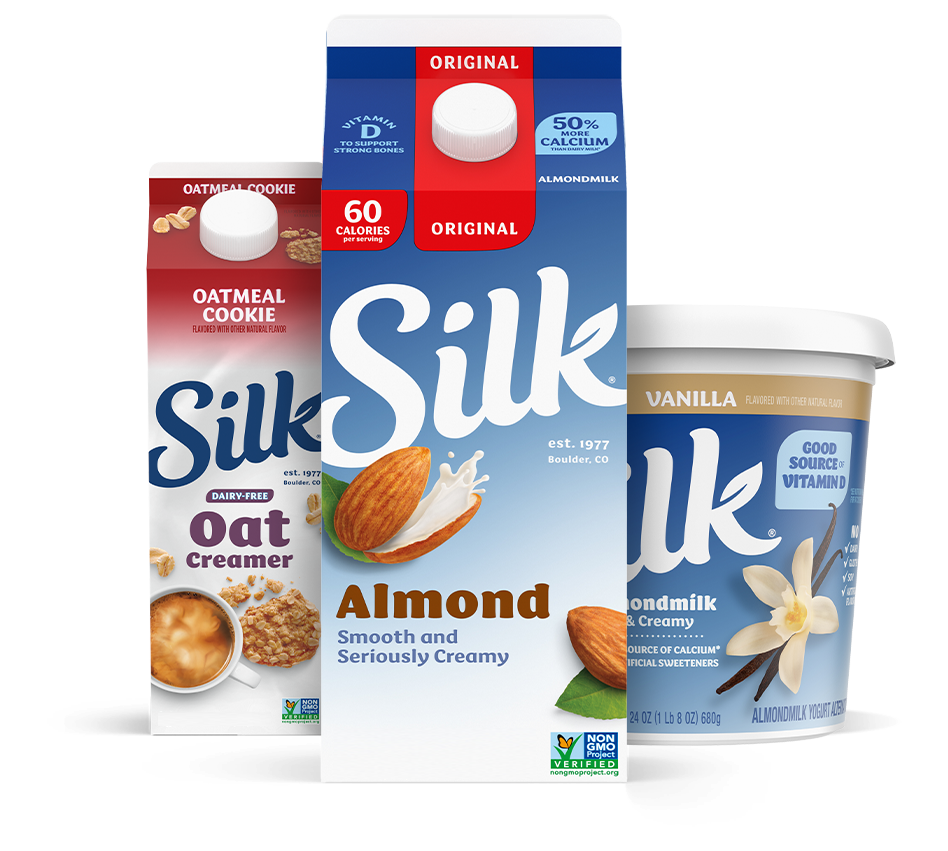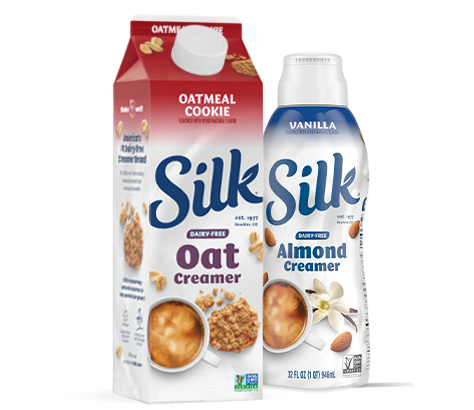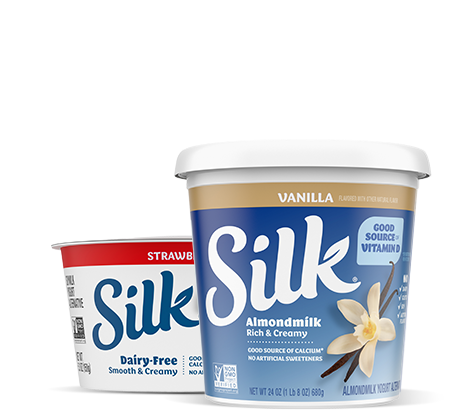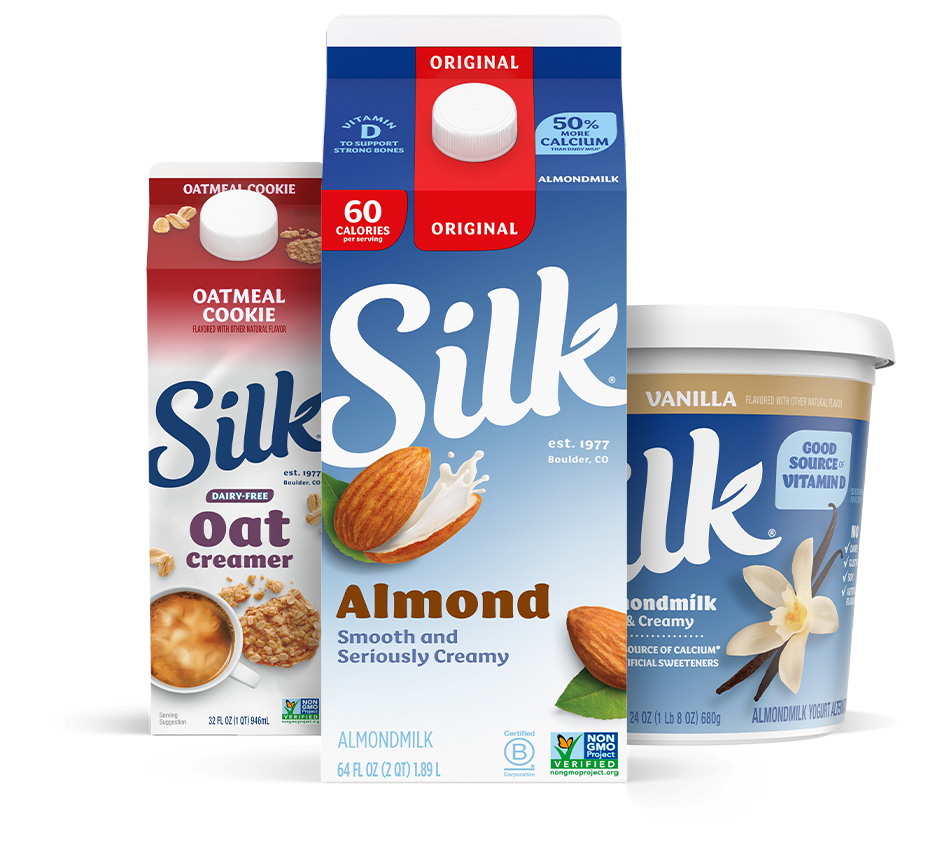

- Allergens and dietary restrictions
- Ingredients and nutrition
- Storage, usage and freshness
- About Silk
- Certified B corporation®, sustainability and recycling
- The Non-GMO Project’s Product Verification Program
Allergens and dietary restrictions
-
Are Silk® products vegan?
Yes, all Silk products are vegan. There are no animal products, by-products or derivatives in our products. The calcium used in our products is derived from natural limestone. All other vitamins—including vitamin D—and live and active cultures used in our products are not sourced from animals.
-
Are all Silk products dairy-free?
Yes, everything we make is dairy-free. We have allergen protocols in place to prevent and detect contamination by dairy or dairy components. Anyone with allergies should always consult a doctor before introducing a new food.
-
Can I drink and eat Silk products if I am allergic to dairy?
All Silk products are dairy-free, lactose-free and casein-free, and they can be suitable for people with dairy allergies. We have allergen protocols in place to prevent and detect contamination by dairy or dairy components.
A dairy allergy is an extreme sensitivity to the proteins in dairy products and should not be confused with lactose intolerance. Dairy allergies can range from mild indigestion to anaphylaxsis, which is an acute reaction. People with lactose intolerance have difficulty digesting the naturally occurring sugar in milk, which can cause stomach discomfort. Anyone with allergies should always consult a doctor before introducing a new food.
-
Can I drink and eat Silk products if I am lactose intolerant?
Absolutely. Silk products are lactose-free.
-
Can I drink and eat Silk products if I am allergic to nuts?
We produce many products containing nuts. To confirm whether a specific product contains nuts, always check the allergen statement, which can be found on the nutrition facts panel. The statement appears under the ingredients list. Also, many of our products are produced on shared equipment. Because consumer safety is our highest priority, we have allergen management protocols in place to help ensure that ingredient commingling does not occur. However, anyone with allergies should always consult a doctor before introducing a new food.
-
Are Silk products gluten-free?
All Silk products are gluten-free and can be suitable for people with gluten allergies. We have allergen protocols in place to prevent and detect contamination by gluten or gluten components. Of course, those with allergies should always consult a doctor before introducing a new food.
-
Are Silk products kosher?
All Silk products are certified Kosher OU-D. This means that our dairy-free products may have been processed on equipment that was also used for dairy. It does not indicate the presence of dairy components in the products. We have allergen protocols in place to prevent and detect contamination by dairy components. The Orthodox Union certifies our products. For more info, visit www.oukosher.org.
-
I am allergic to certain ingredients. What does Silk use in its natural flavors?
Our natural flavors are derived from natural sources such as spice, fruits or fruit juice, vegetables or vegetable juice, edible yeast, herbs, bark, buds, roots, leaves or similar plant material. We confirm with our suppliers that our natural flavors do not contain ingredients derived from the eight most common allergens: milk, eggs, fish, shellfish, tree nuts, peanuts, wheat and soy. We also confirm that the following sensitizing agents are absent from our flavors: mustard, other cereals, sesame, celery, mollusks, sulfites and lupin.
-
Is Silk Oatmilk gluten-free?
Yes, Silk Oatmilk is gluten-free.
-
Is Silk Almondmilk creamer vegan?
Yes, all Silk products are vegan.
-
Is Silk Vanilla Almondmilk gluten-free?
Silk products are gluten-free and can be suitable for people with gluten allergies. We have allergen protocols in place to prevent and detect contamination by gluten or gluten components. Of course, those with allergies should always consult a doctor before introducing a new food.
-
Is Silk Almondmilk good for diabetics?
Individuals with diabetes should always consult with their healthcare provider or registered dietitian for specific questions about diet and carbohydrate consumption as it relates to their health. Silk almondmilk fits within an overall healthy eating pattern and balanced lifestyle.
-
Is Silk Dark Chocolate Almondmilk vegan?
Yes, all Silk products are vegan. There are no animal products, by-products or derivatives in our products. The calcium used in our products is derived from natural limestone. All other vitamins—including vitamin D—and live and active cultures used in our products are not sourced from animals.
-
Is Silk Coconutmilk paleo?
Coconuts are generally accepted as part of a Paleo diet. For an individual desiring to consume a Paleo diet, we recommend working with a registered dietitian or healthcare professional in determining what is right for their individual Paleo eating pattern.
Ingredients and nutrition
-
Can Silk products be used as infant formula?
No, they cannot. Our products are not designed to be a replacement for breast milk or infant formula.
-
Can children consume Silk products?
We recommend checking with your pediatrician about the best diet for your child.
-
Are Silk products appropriate for pregnant or nursing women?
If you are pregnant or nursing, please be sure to discuss food and nutrition concerns with your doctor.
-
What types of sweeteners are in Silk products?
Our unsweetened products have 0g added sugar. In our sweetened products, we use cane sugar, except for these products:
• Silk Light soymilk is sweetened with Reb A from stevia, as well as some cane sugar
• Silk organic products are sweetened with organic cane sugar
-
Do Silk products contain carrageenan?
No. Silk products do not contain carrageenan.
-
Do Silk products contain caffeine?
Silk Lattes contain caffeine—80mg per serving in Mocha Almond and Oat Latte and 95mg per serving in Espresso Almond and Oat Latte.
Several of our non Silk-Latte products contain small amounts of caffeine. They are chocolate soymilk, dark chocolate almondmilk, chocolate cashewmilk, chocolate Silk Protein and The Chocolate One Oat Yeah oatmilk.
-
What is gellan gum?
Gellan gum is a food additive and is used as a thickener and stabilizer. It is polysaccharide (starch) gum produced by fermentation.
-
What is sunflower lecithin and what does it do?
Sunflower lecithin is an emulsifier, which allows ingredients to be blended together, providing stability and smooth texture.
-
Where does Silk get its almonds?
Our almonds come from California. All our almondmilk is verified by the Non-GMO Project’s Product Verification Program. Want to know the secret behind the smooth taste of our almondmilk?
-
Where does Silk get its soybeans?
Our soybeans are all grown in the United States and Canada. All our soymilk is verified by the Non-GMO Project’s Product Verification Program. We employ robust testing protocols to ensure that our beans meet the highest standards of quality, consistency and safety.
Our organic soymilks are made with soybeans that are certified organic by independent agencies accredited by the U.S. Department of Agriculture (USDA), in compliance with the organic standards set by the National Organic Program (NOP).
Get smart about the mighty soybean here.
-
The nutrition facts look different than they used to on your packaging. Why?
The FDA is moving to new labeling requirements for food manufacturers. The new format for the nutrition facts table will make it easier for consumers to inform themselves. The new format indicates calories and nutrients on both a “per serving” and "per package/per unit" basis.
For more info on the FDA regulation, visit the FDA website.
-
Why are the percentages/numbers different on the new nutrition facts?
The FDA is moving to new labeling requirements for food manufacturers. As part of these requirements, the FDA has changed the Total Daily Values for many nutrients, and that in turn changes how the Daily Value percentages for nutrients are calculated.
Get additional information on the Nutrition Facts Label on the FDA’s website.
-
Is Silk Almondmilk healthy?
Silk has a variety of plant-based beverages that vary in nutrition content, and can fit within an overall healthy diet and balanced lifestyle.
-
Are Silk plant-based beverages good for you?
Silk makes a variety of dairy-free plant-based beverages (soy, coconut, almond, oat etc). Please see labels for detailed nutritional profiles. Silk can fit within an overall healthy diet and balanced lifestyle.
-
Is Silk Almondmilk good for you?
Silk makes a variety of dairy-free plant-based beverages (soy, coconut, almond, oat etc). Please see labels for detailed nutritional profiles. Silk can fit within an overall healthy diet and balanced lifestyle.
-
Does Silk Almondmilk have estrogen?
No, none of the Silk products contain estrogen.
-
What does Silk Almondmilk taste like?
Silk Almondmilk has a slightly roasted almond and milky taste with balanced sweetness throughout.
-
Does Silk Dairy-Free Yogurt Alternative have probiotics?
Silk Dairy-Free Yogurt Alternative does not have probiotics.
-
Is Silk Almondmilk organic?
Some Silk Almondmilks are organic. Please see label for verification.
-
Is Silk Almondmilk whole30 approved?
No. For individuals desiring to consume a Whole30 diet, we recommend working with a registered dietician or healthcare professional in determining what is right for their individual eating pattern.
-
Is Silk Almondmilk whole30 compliant?
No. For individuals desiring to consume a Whole30 diet, we recommend working with a registered dietician or healthcare professional in determining what is right for their individual eating pattern.
-
Is Silk Soymilk genetically modified?
No, Silk Soymilk is not genetically modified.
-
What is the difference between Silk plant-based beverages and regular milk?
Silk makes a variety of dairy-free, plant-based beverages (soy, coconut, almond, oat, etc). Dairy milk comes from cows. Please see labels for detailed nutritional profiles.
-
Does Silk Soymilk have carrageenan?
No. Silk products do not contain carrageenan.
-
Is Silk Almondmilk GMO free?
Many Silk products are Non-GMO Project Verified and/or Organic certified.
-
Is Silk Cashewmilk gluten-free?
Yes, Silk Cashewmilk is gluten-free.
-
Are Silk plant-based beverages GMO free?
Many Silk products are Non-GMO Project Verified and/or Organic certified.
-
Are Silk plant-based beverages organic?
Some Silk plant-based beverages are organic. Please see label for verification.
Storage, usage and freshness
-
Are Silk products pasteurized?
Yes, we use ultra-high temperature pasteurization to ensure that our products are free of harmful microorganisms.
-
How long do Silk products stay fresh?
Silk refrigerated beverages and creamers will stay fresh in your refrigerator until the date stamped on the package. Once opened, they need to be consumed within 7 to 10 days. It is not unusual for our products to remain good past the 10-day mark. However, we only guarantee that they will be good for 7 to 10 days once opened.
Silk dairy-Free yogurt alternative in single-serve containers will stay fresh in your refrigerator until the date stamped on the container. Once opened, the contents should be eaten immediately. We also make dairy-free yogurt alternative in multi-serve tubs. Once opened, the contents should be consumed within a few days.
Silk shelf-stable products do not need to be refrigerated until they are opened and will stay fresh until the date stamped on the package. Once opened, they must be refrigerated and will stay fresh 7 to 10 days.
-
What does “shelf-stable” mean?
“Shelf-stable” refers to the special packaging some of our products come in. Shelf-stable packaging is sterile and airtight, so it can be safely stored at room temperature. Once opened, shelf-stable products must be refrigerated and will stay fresh 7 to 10 days.
-
Can I freeze Silk products?
We do not recommend it. Although freezing does not affect their safety or nutritional value, Silk products change in texture when thawed. However, Silk beverages perform well in frozen dessert recipes.
-
Can Silk Almondmilk be heated?
Yes, there are a variety of recipes on the Silk website showing examples of ways to use almondmilk in cooking applications.
-
How long does Silk Cashewmilk last?
Please refer to the expiration date on each carton. The product stays fresh 7-10 days after opening and must be refrigerated.
-
Can you freeze Silk Cashewmilk?
We do not recommend it. Although freezing does not affect their safety or nutritional value, Silk products change in texture when thawed. However, Silk beverages perform well in frozen dessert recipes.
-
Can you heat up Silk Soymilk?
Yes, there are a variety of recipes on the Silk website showing examples of ways to use soy milk in cooking applications.
-
How long can Silk Almondmilk sit out unrefrigerated?
The product stays fresh 7-10 days after opening and must be refrigerated.
-
Does Silk Almondmilk have a safety seal?
Yes, it has a pull ring.
About Silk
-
Who owns Silk plant-based beverages?
Danone North America owns Silk.
-
How can I learn more about the company that makes Silk?
Silk is part of Danone North America, which you can check out at danonenorthamerica.com.
-
How did Silk get started?
We’ll tell you all about it here.
-
What are Silk plant-based beverages?
Silk has a variety of plant-based beverages including Nextmilk, Almond, Oat, Soy, Coconut, Cashew, Ultra and Protein.
-
How is Silk Almondmilk made?
Silk Almondmilk Manufacturing Process: Almond to Almond Butter Harvest - Almonds are grown on trees (Almond Orchards). When ready for harvest, shake the “L” out of them. Hulling/Shelling - Hulls and Shells are separated from the “nut meat”- results in a whole, raw almond. Blanching - Skin is removed; Almonds are “pasteurized”, and stored until needed (The process of making almond milk includes blanching, where the almonds are soaked in boiling water prior to roasting. No chemicals are used in the process.) Roasting - Multi-zoned oven drives off moisture, develops color and flavor. Nuts to Butter - Roasted Almonds are ground into a smooth, creamy paste (use your coffee grinder to do it at home!) There is no pulp after processing. Packaged to Ship - Butter is pumped to a filler, then filled into pails. Almond Butter to Almondmilk - Batching of Almondmilk - Filtered Water, Almond Butter, Natural Sugar, Stabilizers, Natural Vanilla, and Vitamins and Minerals are mixed together. The Process - The Almond Milk is Ultra-Pasteurized. Heated, homogenized, cooled, and sent to an aseptic holding tank. Filling/Packaging - Cartons are formed, sterilized, filled, sealed, labeled, and cased. Storage - Cases are palletized and stored in a refrigerated warehouse.
-
How are Silk plant-based beverages made?
Silk Almondmilk Manufacturing Process: Almond to Almond Butter Harvest - Almonds are grown on trees (Almond Orchards). When ready for harvest, shake the “L” out of them. H ulling/Shelling - Hulls and Shells are separated from the “nut meat”- results in a whole, raw almond. Blanching - Skin is removed; Almonds are “pasteurized”, and stored until needed (The process of making almond milk includes blanching, where the almonds are soaked in boiling water prior to roasting. No chemicals are used in the process.) Roasting - Multi-zoned oven drives off moisture, develops color and flavor. Nuts to Butter - Roasted Almonds are ground into a smooth, creamy paste (use your coffee grinder to do it at home!) There is no pulp after processing. Packaged to Ship - Butter is pumped to a filler, then filled into pails. Almond Butter to Almondmilk - Batching of Almondmilk - Filtered Water, Almond Butter, Natural Sugar, Stabilizers, Natural Vanilla, and Vitamins and Minerals are mixed together. The Process - The Almond Milk is Ultra-Pasteurized. Heated, homogenized, cooled, and sent to an aseptic holding tank. Filling/Packaging - Cartons are formed, sterilized, filled, sealed, labeled, and cased. Storage - Cases are palletized and stored in a refrigerated warehouse.
-
How many kinds of almonds are in Silk Allmondmilk?
Silk Almondmilk is made with three kinds of almonds including mission, caramel, and nonpareil varietals sun toasted and blended for taste.
-
Where is Silk Soymilk made?
Manufacturing locations in the United States.
-
Why does my favorite Silk product look different?
Starting January 2023, Silk will have a new look that’s even easier to find on shelves! Kicking off with our almond products, we’ll eventually work our way through the whole Silk family. It’s what’s on the inside that counts, but the outside will just look a bit different. Check out all our new designs here.
-
Are Silk products made in Boulder, Co?
Silk has roots in Boulder, CO but we currently manufacture our products at facilities across the United States.
Certified B Corporation®, sustainability and recycling
-
When did Silk become part of the Certified B Corporation® movement?
-
What are Silk’s sustainability platforms?
We’re focused on water conservation, packing and recycling, and helping bees and other pollinators. See what we’re doing here.
-
Is Silk packaging recyclable?
Yes, where facilities exist. We'd love to see every Silk carton, cup and bottle properly recycled. Please follow the How 2 Recycle directions on the packaging. Our yogurt containers are made from polypropylene (PP), which is classified as a #5 plastic and can also be recycled by most available programs. Please contact your local recycling facility for more information.
The Non-GMO Project’s Product Verification Program
-
What does GMO stand for?
Genetically modified organism.
-
What is a GMO?
According to the Non-GMO Project, “A GMO, or genetically modified organism, is a plant, animal, microorganism or other organism whose genetic makeup has been modified in a laboratory using genetic engineering or transgenic technology. This creates combinations of plant, animal, bacterial and virus genes that do not occur in nature or through traditional crossbreeding methods.” Check NonGmoProject.org for more info. Thirty countries around the world—including European Union members—have chosen to place significant regulations on genetically modified foods and products.
-
What is the Non-GMO Project?
The Non-GMO Project is a nonprofit collaboration of manufacturers, retailers, farmers and consumers dedicated to ensuring the availability of non-GMO foods and beverages. The Non-GMO Project provides independent, third-party verification and non-GMO guidance for products in the U.S. and Canada.
-
Why doesn’t the Non-GMO Project Verified seal appear on my Silk package?
Every product we offer is enrolled in the Non-GMO Project, which means a third party reviews our ingredients and protocols to make sure we meet the Project’s high standards for non-GMO foods. Learn more here. Once the evaluation is complete, we’re cleared to display the “Non-GMO Project Verified” seal on our packaging. Because the verification process is elaborate, and updating our packaging can take a few months, you may see some of our newer products on the shelf without the “Non-GMO Verified” seal in place. Sometimes our smaller packages don’t carry the seal simply due to space constraints. A comprehensive list of verified products is available online at NonGMOProject.org.








